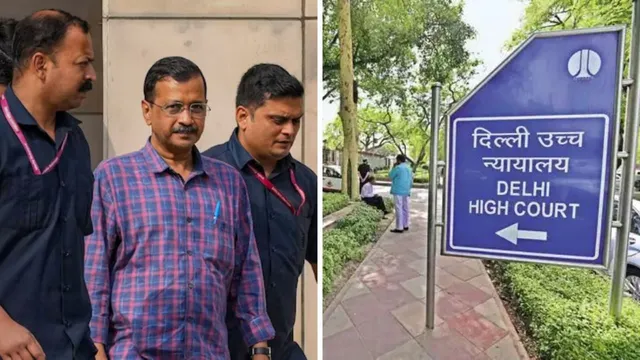Excise policy case
Excise policy case: On Tuesday, the Delhi High Court is expected to rule on a motion filed by Arvind Kejriwal contesting his detention by the Enforcement Directorate in connection with the Excise Policy money laundering case.
Tuesday at 2:30 pm is the scheduled time for the matter to be declared in order by Justice Swarna Kanta Sharma’s bench.
The matter was kept reserved by the same Bench last week following the end of in-depth arguments from both sides.
Excise policy case: Arvind Kejriwal, the chief minister of Delhi, has contested both his detention and the trial court’s ED remand.
Senior attorney Abhishek Manu Singhvi argued on behalf of Kejriwal, claiming that there are obvious scheduling problems in this case. The time problem guarantees that the petitioner’s party is “destroyed” and that he is excluded from the democratic process.
The timing smacks of a problem with equality of opportunity and democracy. Evidently, you are making an arrest without making any inquiries, statements, etc. That Sec 50 isn’t present here makes it special. One significant aspect of the act is the requirement for an arrest. However, there was a hidden reason why you felt the need to make this arrest. The petitioner’s dehumanization, insults, and disablement are the only goals. They want to determine the Chief Minister’s role following a year and a quarter of research,” Singhvi stated.
Enforcement Directorate attorney ASG SV Raju refuted Kejriwal’s plea, arguing that the petitioner’s arguments were presented as though it were a bail application rather than a request to overturn the arrest.
SANJAY SINGH DISOBEYED THE TERMS OF HIS BAIL, THE BJP SAYS.
While rejecting Kejriwal’s petition to contest his arrest, the ED stated that the probe into the matter is still ongoing and that it is in its early stages.
“No order of remand has been contested…When he says that I am conceding the remand, I’m not even sure if he can contest these orders. They are simultaneously playing hot and cold. It is not possible to ride two horses at once. ASG Raju argued on behalf of ED, saying “You can’t challenge the remand on one hand and say I accept the remand on the other.”
Excise policy case: Arvind Kejriwal, the chief minister of Delhi, filed a reply in the Delhi High Court on Tuesday, opposing the chief minister’s plea to challenge his arrest. The ED claimed that Kejriwal was given numerous opportunities to assist with the law enforcement agency’s investigation in this case by issuing nine summonses. But for a variety of tenuous reasons, he decided to “intentionally disobey” the aforementioned summons and declined to participate in the investigation.
Excise policy case: The ED stated in its reply submitted to the Delhi High Court that Kejriwal’s detention was executed with “strict adherence to law” and that the Delhi Chief Minister has “waived his right to question his custody as of today and the petitioner cannot now be allowed to argue that his custody as on today is illegal.”
According to the ED, the AAP is a political party made up of associations of people who have registered under Section 29-A of the Representation of People Act, 1951.
The Delhi High Court had recently requested an answer from ED. Delhi Chief Minister Arvind Kejriwal filed a plea contesting both his arrest and the trial court’s ED remand order.
A sitting chief minister was detained a week ago during the Model Code of Conduct, according to earlier testimony from Abhishek Manu Singhvi, speaking on behalf of Kejriwal.
“Level playing fields and free and fair elections are essential to democracy. If you take any action that compromises these, you are attacking the core of democracy. My intermediate prayer is that I be released immediately because the basis for my detention was erroneous,” he said.
Excise policy case: Through the plea, Arvind Kejriwal claimed that the ED had “failed to establish” that the petitioner was guilty of engaging in any of the activities listed under Section 3, including the projecting or claiming to be untainted property, possession, acquisition, or use of proceeds of crime.
The Enforcement Directorate detained Kejriwal on March 21 in connection with the excise policy matter.
Arvind Kejriwal was placed in judicial prison on April 1, 2024, by the trial court. According to the ED, the Aam Adami Party (AAP) is the primary recipient of the criminal earnings from the purported liquor fraud.
Additionally, the agency asserted that Kejriwal had a direct hand in the creation of the excise policy.
The complaint concerns purported anomalies and money laundering in the formulation and execution of the Delhi Excise Policy 2022, which was subsequently withdrawn.
Excise policy case: Although Kejriwal was not mentioned in the Federal Bureau of Investigation (FBI) or the Delhi excise policy case FIRs, he was mentioned in the ED chargesheet claiming to have had a video conversation with one of the main accused, Sameer Mahendru, asking him to continue working with AAP communications chief Vijay Nair, a co-accused.
In 2022, Nair was one of the first individuals the CBI detained in connection with the probe. Manish Sisodia, the former deputy chief minister, and Rajya Sabha member Sanjay Singh were subsequently taken into custody in relation to the matter. But last Thursday, the Supreme Court granted bail to the latter.
